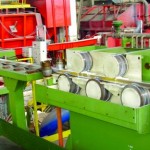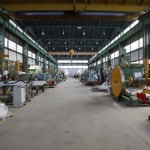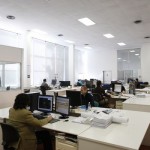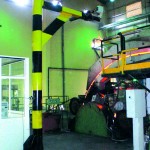In the present market situation, the new initiatives are oriented towards cutting-edge and high added value products: it is the right time for the companies that are moving towards this direction. Giulio Properzi, president of Continuus-Properzi talked about that with us in the course of this interview
From your observation point, how do you judge the trend of the metal machining sector in this last period and what evolutions do you dare to hypothesize?
Unfortunately the world scenario is not encouraging in our sector. In almost all fields the crisis has generated a situation of productive overcapacity, sometimes by 40-50 %, and therefore the recovery will be quite slow.
What is, in your opinion, the right interpretation of the present market, which can allow facing up and overcoming challenges adequately?
In the situation that I have described, investments are drastically reduced, but not completely annulled. The new initiatives are focused on more advanced products standing out for higher added value; therefore, it is the right time for companies that can offer new machines, new products and new technologies to the market, while those concentrated on standard goods, even if of excellent level, will have to struggle if they want to survive.
What are at present the needs and the problems that prevailingly arise in your operating ambit and how can your company meet them?
Our case is that of a total exporter, or almost, and then we are in the best conditions to seize all the opportunities offered by a really international market. Nevertheless, the sector of copper wires is living a real crisis and, like for everybody, also for us it is the time of playing defence with a prudent management of resources, however avoiding losing important competences that will be necessary for the market recovery. Recovery that I optimistically expect for the late 2014.
What relevance has the Research&Development activity today for a reality that intends to be competitive on the global market? How does your company operate concerning this matter?
Talking about Research & Development (R&D) in Italy is a real minefield. There is great confusion even in its very definition. They confuse – or they ignore because it is not accounted – that constant work dedicated to the improvement of one’s own products and processes, which all our sound enterprises carry out with the long-term R&D, and with ambitious targets that call for the participation of big entities, that’s to say huge investments, universities and state funding. Concerning this latter type of R&D, I can report my personal experience: that of a research project with development and experimentation of a prototype for which in 2002 we asked for a state participation. The project was approved along the years by various commissions, we spent a considerable initial budget and we produced paper on paper during the years, but until now, after over 10 years, nothing has materialized, even if we are constantly informed because the final signature is very close. Luckily, but only by a lucky chance, after more than 10 years the research project is still valid from the technical point of view. It is anyway clear that these biblical times are unbearable and those who talk about R&D as result of deliberations by the various Governments do not know what they are talking about or enjoy reserved lanes. It would be also worth reminding more often that the goal of the R&D activity is innovation but that the better is innovation the more numerous enemies arise to maintain, or to prolong in time, the “status quo ante”, and then the pay back is always much longer than what forecast.
What are your everyday targets and the long-term projects?
Our minimal everyday goal is to succeed in paying all salaries and having at least a balanced budget until when “we pass through the dark times”; with the successive commitment of making gains and developing the company in less critical years. In the longer term we are studying how to use autonomously our technology, that’s to say to become users of our plants. With regret, however, we see that this development might be attractive only in other Countries and not in Italy. Not only owing to our economic crisis but because too much bureaucracy, too many laws and their free interpretation, against enterprises and entrepreneurs, summed to the high energy cost, discourage any investor having a choice possibility.
How do you gain your customers’ confidence and how can you make them feel your proximity concretely?
I can answer this question simply: never doing the smart ones! And keeping the promises – very clear – that you make by promoting and selling your own products.
What importance hold saving and energy efficiency in the context of today’s industrial dynamics? What is the position of your company about that?
It seems a redundant question to me. Energy saving and efficiency have always been on the agenda in industry and we do not discover them today, due to the Italian costs both of gas and of kW/hour.
How do you judge the present situation of access to credit of Italian enterprises?
We have already talked diffusely about credit crunch. It exists, it is real and it is strong. Weakened banks that treat the credit with very weak companies are a very bad scenario. This is only the downstream effect of international financial crises and of the crisis of the European policy in reacting to them. Only when – and we hope soon – upstream problems will find a waterline, we will forget the credit crunch to enterprises.
Do you think that an active proximity between labour world and university/research world is decisive for the technological development of a Country? How do you evaluate the Italian situation in such context?
I change just the verb to the first question and I say “it should be decisive”, but on the contrary it does not exist, except for some exceptions.
Internationalization, a word with several meanings
Today one of the crucial themes for the companies of our Country, and not only, is internationalization. The term encompasses several meanings in itself, but also various misunderstandings, as states engineer Properzi: «This word, difficult to pronounce, has several meanings and carries in itself lots of ambiguities. If with internationalization we mean the capability of being global exporters, I believe that ACIMAF members can give lessons to all. On the contrary, for the local producers of springs or wires, that’s to say suppliers of an essentially local or territorial market, the meaning must be different, that’s to say to have their eyes open to the world, both concerning technology and the exploitation of any possible opportunity of partnership or of development in other Countries ». and from that spontaneously springs the delocalization matter, equally central and debated in the course of these years. «Also the delocalization, another difficult word, is an aspect of the internationalization – adds Giulio Properzi –. Today to establish in other nations, maybe close such as Switzerland, is a winning option. We need however a change of course regarding the competitiveness of Italy urgently, so that internationalization becomes a choice again and not a must to survive.»
Business networks: projects and realities
We often talk about business networks as a valid instrument, sometimes the only one, able to offer higher force and competitiveness on the current market. Today collaboration, exchange and aggregation among enterprises represent in fact an alternative business model with regard to the traditional one. What is the opinion of Mr Properzi about that? «It seems that business networks start functioning – he states –, but it is still a long way to run if we want to make the mentality of the average Italian entrepreneur less provincial. It is a strange phenomenon: lots of them indeed are ready and also capable of dialoguing with the world and few, on the contrary, open to the dialogue with suppliers and/or competitors of their territory ».








